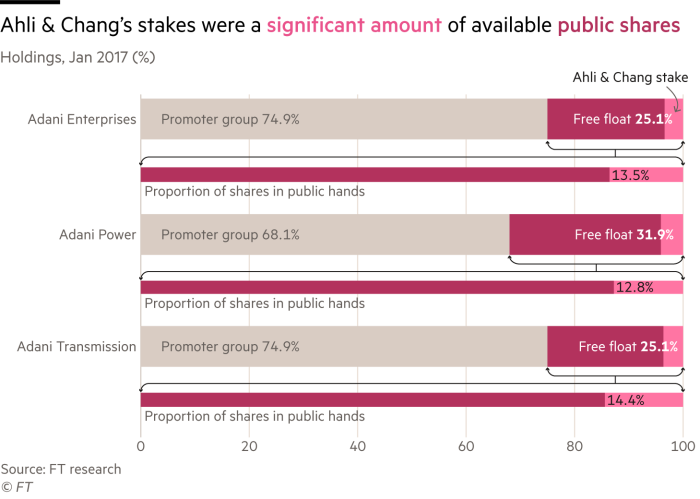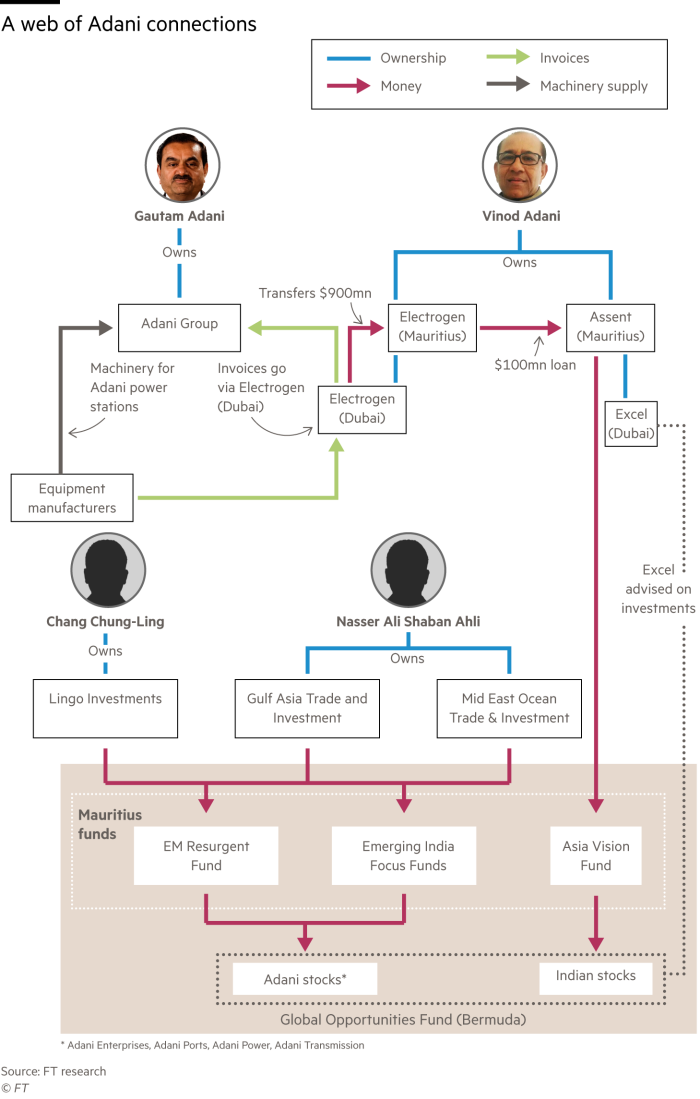The paper trail revealing hidden Adani investors

Roula Khalaf, Editor of the FT, selects her favourite stories in this weekly newsletter.
Welcome to Due Diligence, your briefing on dealmaking, private equity and corporate finance. This article is an on-site version of the newsletter. Sign up here to get the newsletter sent to your inbox every Tuesday to Friday. Get in touch with us anytime: Due.Diligence@ft.com
In today’s newsletter:
Adani’s hidden investors
The Sculptor saga continues
More antitrust troubles for Microsoft
Adani Group’s hidden investors
When short seller Hindenburg Research accused Gautam Adani — then Asia’s richest man — of “pulling the largest con in corporate history” earlier this year, a key component of the New York firm’s allegations concerned the role of Gautam’s older brother Vinod Adani.
The elder Adani had used a web of offshore entities domiciled in Mauritius and other offshore havens to move billions of dollars into public and private Adani Group companies in India, Hindenburg alleged, flouting disclosure rules in the process.
Now, new documents shared with the FT by the Organized Crime and Corruption Reporting Project reveal new insight into some of Hindenburg’s claims, which Adani Group has strenuously denied.
As the FT’s Dan McCrum and John Reed sorted through the paper trail, two names arose as the most significant investors in the broader scheme outlined by Hindenburg: Nasser Ali Shaban Ahli from the United Arab Emirates and Chang Chung-Ling from Taiwan — both of whom are associates of Vinod’s.
Using bespoke investment structures within the Bermuda-based Global Opportunities Fund, the pair were able to buy and sell significant chunks of Adani shares and derivatives in secret, the documents show. Neither of their identities had been previously disclosed to regulators.
An Adani spokesperson said its listed entities were in compliance with all laws, and the company that established the structure said there was no wrongdoing associated with it.
By January 2017, according to the documents, Ahli and Chang had amassed stakes in Adani Group worth $363mn and secretly controlled at least 13 per cent of the free float (the shares available to be traded by the public) in three of the four Adani companies listed at the time, including the group’s flagship Adani Enterprises.

Here’s why that matters: under Indian stock market rules, shares held by a company’s so-called promoter group — aka corporate insiders such as family members or close associates — aren’t supposed to exceed 75 per cent. Breaches of the rule can lead to delisting.
Should India’s securities regulator treat the two men as proxies for Vinod and therefore a part of the promoter group, it would mean Adani companies repeatedly breached the rules designed to prevent artificial inflation of share prices.
(Adani Group has firmly denied this possibility, citing a Supreme Court-appointed panel report which stated that suspicions around certain public shareholders being fronts for promoters were “not proved”. The panel also found no evidence of artificiality to the price rise or any material to attribute the rise to any entities.)
The documents reveal a convoluted paper trail showing how Ahli and Chang pulled off these trades, tracing a route from India to Dubai, to Mauritius, to Bermuda, Mauritius again, and then back to India.

We recommend you read Dan and John’s full story to get the gist.
Shares in the Indian industrial conglomerate slid following the publication of reports by the FT and The Guardian on Wednesday, while opposition politicians demanded action. Adani categorically rejected what it called “recycled allegations”, and sought to link the reports to billionaire philanthropist George Soros.
After Hindenburg’s initial affront, many of Adani’s powerful friends and billionaire backers remained by his side as his empire fell under scrutiny.
Investors including Abu Dhabi’s International Holding Company and London-listed Jupiter Asset Management still backed an eventually cancelled share sale by the group, while star stockpicker Rajiv Jain of GQG later came to Adani’s rescue with a $1.9bn boost.
DD is curious to see whether loyalties will be retested in light of the new information.
The Sculptor hedge fund drama continues
Dealmaking may be going through a quiet period, but the bizarre situation at Sculptor Capital Management has helped keep things interesting.
The tale involves some of the wealthiest investors on Wall Street, a scorned billionaire founder and a battle to control the narrative in one of the most public hedge fund fights in recent memory.
On Wednesday, Sculptor — which in July agreed to sell itself to real estate specialist Rithm Capital for $639mn — turned down another high offer made by a group of rich hedge fund investors including Boaz Weinstein and Bill Ackman.
Despite their $12.76 per class A share offer being an almost 15 per cent increase to the Rithm deal, Sculptor isn’t engaging with the Weinstein-led group for various reasons, as DD broke down several weeks ago.
This has caused a lot of friction with Sculptor’s founder Daniel Och, who has repeatedly called on the company’s board to release bidders from their non-disclosure agreements and engage with those offering a higher price. Both Och and Sculptor’s board members have accused one another of not acting in the best interest of shareholders.

It’s fair to say that Och has a lot of skin in the game. As DD’s Sujeet Indap, Ortenca Aliaj and Antoine Gara explain, the billionaire investor is in line to receive the majority of the $173mn owed to Och and the other founders stemming from something called a tax receivable agreement (TRA).
When Sculptor, then known as Och-Ziff Capital Management, went public in 2007, it did so using something called an Up-C structure. That allows the company to realise corporate tax deductions when Och and the other founders swap their partnership units into common stock, the benefits of which are then passed on to them.
The Och group has already reaped $150mn in TRA payments since the company’s IPO, according to Sculptor, but they also want a significant portion of the remaining $173mn to be prepaid as part of the deal with Rithm. This seems to have become a sticking point in getting a deal over the line.
Neither party is holding back. In the past couple of weeks alone, several letters going back and forth have been made public, with Sculptor accusing Och of orchestrating a campaign of “retribution” and a “well-publicised, years-long smear campaign against the company’s management”.
Och in return has repeatedly criticised the board and says they’re acting to save the jobs of existing management including Jimmy Levin, his protégé-turned-nemesis and the group’s current chief executive.
There will undoubtedly be more to come, so don’t put your popcorn down just yet.
Microsoft’s antitrust troubles aren’t over
After dodging a bullet from the UK’s competition regulator with regard to its $75bn acquisition of Activision Blizzard, Microsoft has found itself fighting a separate battle with the EU.
Just over a week after offering British regulators its biggest concession yet to salvage the gaming mega-deal, the tech giant is working to quell concerns by the European Commission that its Office software could be restricting competition.
Part of Microsoft’s plan to appease antitrust watchdogs will be to remove the videoconferencing app Teams from its Office suite of programs and make it easier for competing apps to be interoperable.
The move comes after the EU’s executive body launched a probe in July into claims by Microsoft rival Slack, now owned by Salesforce, that Microsoft had been using its dominance to thwart the competition by tying Teams to its Office software.
There’s no guarantee that Microsoft’s latest changes will be enough. The commission was set to issue formal charges against the tech group in the autumn, people with knowledge of the process told DD’s Javier Espinoza, suggesting that the company may need to offer more concessions to avert a potential penalty.
Job moves
Standard Chartered has tapped Bank of America’s former global head of investment Diego De Giorgi to replace Andy Halford, who’s stepping down as chief financial officer after more than nine years in the role. De Giorgi was most recently co-chief of Pegasus Europe, the blank-cheque company backed by Bernard Arnault and former UniCredit chief Jean Pierre Mustier.
Apollo Global Management has hired former BlackRock managing director Rick Moreno to lead Western US coverage of its family office business.
Smart reads
Declawed Not long ago, “cubs” of Julian Robertson’s Tiger Management dominated the hedge fund industry. Their recent travails raise the question of whether their investment strategies are stuck in the past, Bloomberg reports.
Pedal to the metal Shares of Vietnamese electric-car maker VinFast have eclipsed those of more established rivals such as General Motors as its billionaire founder Pham Nhat Vuong looks to crack the US market, the FT reports.
The faux financier Kyle Deschanel, a hotshot investor and descendant of the Rothschild banking dynasty, captivated New York’s glitterati and finance set alike. Only, he wasn’t who he said he was, Vanity Fair reports.
News round-up
‘Deal of the century’ — How UBS’s rescue of Credit Suisse proved a boon (FT)
Nadhim Zahawi working with Barclay family on Telegraph bid (FT)
Fed warned Goldman Sachs over risk and compliance oversight at fintech unit (FT)
Big investors seek damages from Glencore over ‘untrue statements’ in prospectuses (FT)
Klarna ready for IPO when conditions improve, says chief (FT)
US Supreme Court’s Clarence Thomas details trips paid for by billionaire (FT)
Due Diligence is written by Arash Massoudi, Ivan Levingston, William Louch and Robert Smith in London, James Fontanella-Khan, Francesca Friday, Ortenca Aliaj, Sujeet Indap, Eric Platt, Mark Vandevelde and Antoine Gara in New York, Kaye Wiggins in Hong Kong, George Hammond and Tabby Kinder in San Francisco, and Javier Espinoza in Brussels. Please send feedback to due.diligence@ft.com
Comments